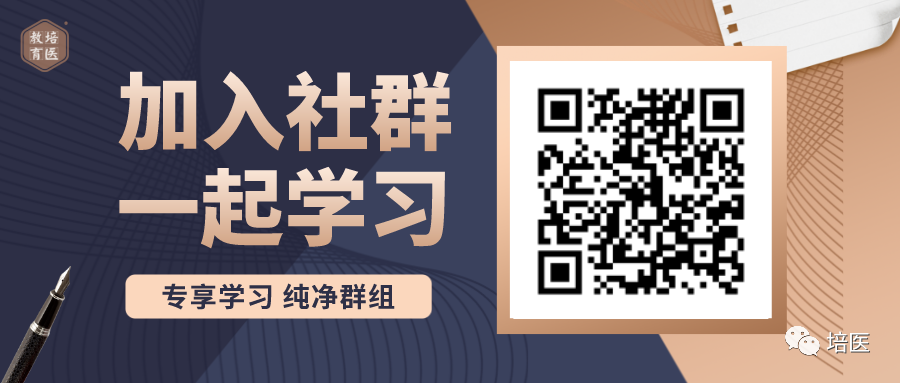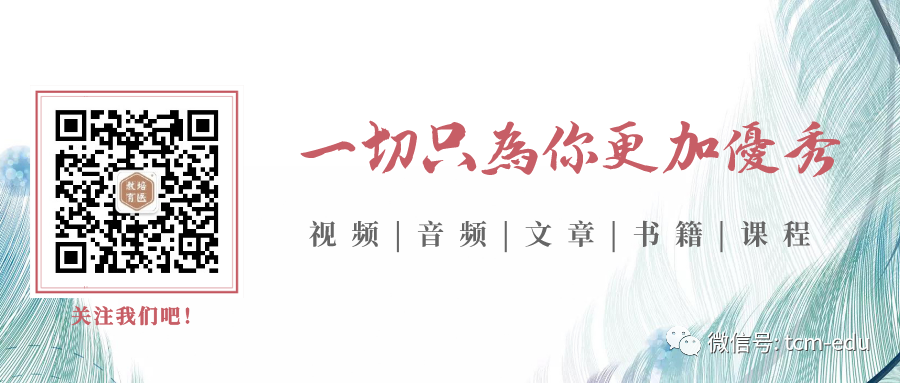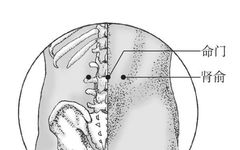Subscribe to Topics and Featured Articles
Health Strategies for Yang Deficiency Constitution — Warming and Nourishing the Spleen and Kidney, Revitalizing Yang QiYang Deficiency Constitution (Cold Intolerant Type) — Fear of Cold, Lack of Vitality
Wearing cotton clothes in winter and short sleeves in summer is normal for most people. However, there are some individuals who must wear long-sleeved shirts even in the hottest weather, and some even wear sweaters or cotton jackets in summer. While others feel comfortable with air conditioning during the hottest days, they must be “fully armed” and endure the cold alone. This is because they have a Yang deficiency constitution, where the Yang Qi in their body is insufficient, making their body feel cold inside and out, like a room without a stove in winter. We vividly refer to them as the “cold intolerant type.”
1. What is Yang Deficiency Constitution?
Yang deficiency constitution refers to a physical state characterized by insufficient Yang Qi in the body, leading to cold extremities and other symptoms of deficiency and cold. Yang Qi plays a role in warming the limbs and organs, similar to the sun in nature. When Yang Qi is insufficient, the internal environment of the person will be in a “cold” state, thus individuals with Yang deficiency constitution often fear cold. Yang deficiency constitution accounts for 7.9% of the total population.
2. Characteristics of Yang Deficiency Constitution
1. General Characteristics
Insufficient Yang Qi, primarily characterized by fear of cold, cold hands and feet, and other symptoms of deficiency and cold.
2. Physical Characteristics
Muscles are soft and weak.
3. Common Symptoms
Main Symptoms: Generally fear of cold, cold hands and feet, preference for warm food and drinks, lack of energy, excessive sleep, pale and swollen tongue with teeth marks, moist tongue coating, and a weak, slow pulse.
Accompanying Symptoms: Pale complexion, dark circles under the eyes, pale lips, hair loss, easy sweating, loose stools, and clear, frequent urination.
4. Psychological Characteristics
Generally quiet and introverted personality.
5. Disease Tendencies
Prone to cold-related diseases, easily developing phlegm, swelling, diarrhea, and impotence. Commonly seen in modern medicine as chronic kidney disease, chronic diarrhea, impotence, and menstrual irregularities.
6. Adaptability to External Environment
Intolerant to cold pathogens, can tolerate summer but not winter, and easily affected by dampness.
3. Check if You Have Yang Deficiency Constitution
1. Do your hands and feet feel cold? (Yes)
2. Do you feel cold in your stomach, back, and lower back? (Yes)
3. Do you feel cold and wear more clothes than others? (Yes)
4. Do you fear cold more in winter and dislike air conditioning or fans in summer? (Yes)
5. Do you catch colds more easily than others? (Yes)
6. Do you feel uncomfortable eating or drinking cold foods? (Yes)
7. Do you easily have diarrhea after getting cold or eating/drinking cold foods? (Yes)
If most of your answers are the same or very close to the standard answers, you can be determined to have this constitution.
4. Typical Case
Ms. Liu has been afraid of the cold since childhood, with cold hands and feet all year round. Although her husband does not say anything, he is very dissatisfied. In spring, when she sees other fashionable girls taking off their cotton coats and wearing beautiful outfits, she envies them greatly. She also hates air conditioning, feeling especially cold in her back, upper abdomen, and legs, which brings great inconvenience to her family. Even when the whole family is warm, she strictly forbids the air conditioning. At work, others cannot accommodate her, so she has to wear a shawl and thick shoes in the middle of summer.
5. Constitution Analysis
Ms. Liu’s situation is a typical case of Yang deficiency constitution.
Yang deficiency constitution is a state of insufficient Yang Qi, or in other words, a lack of vitality. We can compare this vitality to the sun, which shines on the earth, radiating light and heat, allowing all things to grow and humans to reproduce. If the light and heat are insufficient, the earth is shrouded in gloom, and the vitality is weak, then all organs in the body cannot be warmed. Due to the deficiency of Yang Qi in the body, the body loses warmth, resulting in a pale and plump appearance, soft muscles, dark circles under the eyes, and pale lips. The mind loses the nourishment of Yang Qi, leading to lack of energy and excessive sleep. Insufficient Yang Qi reduces the body’s ability to defend against external pathogens, making it easy to sweat and lose hair. When Yang Qi cannot vaporize and transform fluids, individuals often feel thirsty but do not want to drink. The lack of Yang Qi warmth in the body leads to a preference for warm food. Individuals with Yang deficiency constitution can tolerate summer but not winter, are intolerant to cold pathogens, and often suffer from cold-related diseases, which can easily transform into cold syndromes. Yang deficiency cannot warm and vaporize dampness, making individuals with Yang deficiency constitution susceptible to dampness, leading to phlegm, swelling, diarrhea, and other symptoms. In terms of personality, individuals with Yang deficiency constitution are often quiet and introverted.
Health Strategies for Yang Deficiency Constitution — Warming and Nourishing the Spleen and Kidney, Revitalizing Yang Qi
To discuss Yang deficiency constitution, we first need to understand the character “Yang.” If we look at this character and remove the left radical “阝,” we are left with the character “日,” which represents the sun. When we think of the sun, we think of heat. In the body, Yang represents vitality. People often say, “He is a sunny boy,” or “This person is really sunny,” which reflects a vibrant energy, fundamentally due to abundant Yang Qi. When people are warm, they do not seek the sun; only when they are cold do they think of basking in the sun to increase warmth. Yang deficiency constitution refers to insufficient Yang Qi in the body, or simply put, insufficient heat and energy. Due to insufficient Yang Qi, the body cannot nourish itself, leading to a fear of cold. Therefore, the principle of health maintenance for Yang deficiency constitution is to warm and nourish Yang Qi, always paying attention to protecting Yang Qi, focusing on warm and nourishing foods, and avoiding raw and cold foods; in spring and summer, choose sunny weather for outdoor activities, and in autumn and winter, pay special attention to keeping warm, especially in the waist, back, and lower limbs.
Exercise for Health — More Movement, Less Stillness, Movement Generates Yang
Traditional Chinese Medicine (TCM) believes that movement generates Yang. More exercise can accelerate the circulation of Qi and blood, promoting the generation of Yang Qi. Individuals with Yang deficiency constitution should choose to exercise outdoors in warm weather, in gardens, parks, or nature, to invigorate Yang Qi, improve constitution, and enhance the body’s adaptability to the environment. Therefore, physical exercise is very important for individuals with Yang deficiency constitution.
1. Are all sports suitable for individuals with Yang deficiency constitution?
No, not all sports are suitable for individuals with Yang deficiency constitution. For example, swimming is not suitable for individuals with Yang deficiency constitution. When swimming, a large amount of dampness can enter the body through the pores. The activity level in water is high, and the body loses heat quickly. If individuals with Yang deficiency constitution swim, they are more likely to have problems, becoming more susceptible to various diseases. Some individuals with Yang deficiency constitution experience heel pain after swimming in the sea, followed by diarrhea for two to three days. This is because swimming in cold water can damage Yang Qi. The spleen Yang is damaged, leading to diarrhea; the kidney Yang is damaged, causing heel pain. Therefore, individuals with Yang deficiency constitution should “keep their distance” from swimming. Additionally, individuals with Yang deficiency constitution should avoid overly intense sports. In winter, it is best to exercise after the sun comes out and the temperature rises; otherwise, it may not only fail to achieve the desired exercise effect but also easily lead to various diseases due to excessive cold. In summer, exercise should not be too intense to avoid excessive sweating, which can damage Yang Qi.
2. What types of exercise are suitable for individuals with Yang deficiency constitution?
Individuals with Yang deficiency constitution are suitable for low-intensity, gentle exercises such as walking, Tai Chi, Ba Duan Jin (Eight Pieces of Brocade), internal exercises, and dancing. Below are a few exercise methods suitable for individuals with Yang deficiency constitution:
1. Jump Rope Exercise — Generating and Unblocking Yang Qi
Jumping rope is a traditional and simple jumping exercise that can invigorate Yang Qi, promote its generation and unblocking, while also engaging various body parts, enhancing cardiovascular function, and improving the cold tolerance of individuals with Yang deficiency constitution. Many people can jump rope, but to achieve better results in generating and unblocking Yang Qi, the jumping posture must be correct, which requires mastering certain techniques.
(1) Jump Rope Methods
There are two methods of jumping rope: single-foot jumping and double-foot jumping. Single-foot jumping involves alternating feet, resembling a running motion. Double-foot jumping involves turning the rope once while both feet jump together. When jumping, the rope passes under the feet.
(2) Jump Rope Techniques
When swinging the rope forward, keep the upper arms close to the sides of the body, elbows slightly outward, and forearms nearly horizontal. Use the wrists to generate force, allowing both hands to rotate at the sides of the body. Each swing should allow the rope to complete a full rotation from the ground, behind the body, and back down. The speed of the rope’s rotation should match the speed of the hand’s swinging. When jumping, use the balls of the feet to jump and land; individuals with Yang deficiency constitution should avoid landing on the whole foot or heel. When jumping in the air, the body should not bend excessively but should maintain a natural curve. During the jump rope process, breathing should be natural and rhythmic.
2. Kidney Nourishing Exercise — Warming the Kidneys and Strengthening the Waist, Cultivating Yuan Yang
(1) Elbow Flexion and Raising
Sit upright with legs naturally apart, flex the elbows and raise the arms, fingers extended upwards, level with the ears, then raise the arms until you feel a stretch in the sides, then return to the starting position. Repeat this 10 times.
(2) Throwing Motion
Sit upright, with the left arm naturally bent and resting on the leg, the right arm bent with the palm facing up, perform a throwing motion 3-5 times, then switch arms and repeat the same motion with the left arm, doing this 5 times daily.
(3) Leg Swinging
Sit upright with feet hanging down, slowly rotate the body left and right 3 times, then swing both feet back and forth 10 times. This exercise can activate the waist and knees, benefiting the kidneys and strengthening the waist.
(4) Waist Rubbing
Sit upright, loosen clothing, and untie the waist belt. Rub both hands together until slightly warm; then place both hands on the waist and rub up and down until the waist feels warm. This method can help unblock meridians, promote Qi and blood circulation, and warm the kidneys and strengthen the waist.
Entertainment for Health — More Joy, Less Worry, Joy Generates Yang
Individuals with insufficient Yang Qi are often introverted and quiet, frequently exhibiting poor emotions and being prone to worry. They usually do not enjoy participating in social activities or communicating with others. Therefore, engaging in appropriate entertainment activities can help adjust emotions, uplift spirits, and promote the generation of Yang Qi.
Gardening
Individuals with Yang deficiency constitution are suitable for inhaling the fragrances of plants such as roses, jasmine, mint, and sage. Cultivating these flowers can benefit the replenishment of Yang Qi.
Listening to Uplifting Music
Listening to lively music such as “The Blue Danube,” “Spring Song Waltz,” “Tales from the Vienna Woods,” “Step by Step High,” “Joyful Spring,” and “Spring is Here” can help uplift Yang Qi.
Making Friends and Chatting
Making friends and chatting with them during leisure time, watching TV shows or movies together, and enjoying a meal can help individuals with Yang deficiency constitution cultivate a cheerful, optimistic, and open-minded attitude in their daily lives, helping them forget their worries.
Diet for Health — Eat More Warm Foods, Less Cold Foods
Some compare Yang deficiency constitution to a “refrigerator constitution,” as their internal environment resembles a “refrigerator,” making everything inside cold. Once they eat cold foods, their internal temperature drops even further. Therefore, individuals with Yang deficiency constitution should eat more warm foods and avoid raw and cold items.
1. What Foods are Suitable for Individuals with Yang Deficiency Constitution?
Individuals with Yang deficiency constitution are particularly sensitive to cold in winter, so they should consume foods that warm Yang and resist cold to “store heat,” ensuring the body has enough Yang Qi to nourish all tissues and organs, enhancing cold resistance and reducing disease occurrence. Individuals with Yang deficiency constitution can eat the following foods:
(1) Lamb: Warm in nature and sweet in flavor, it is an excellent warming and nourishing food, helping to warm the middle and lower body, tonify Qi, and replenish deficiency. Individuals with Yang deficiency should consume it frequently in autumn and winter for its warming and strengthening effects.
(2) Sparrow Meat: Warm in nature and sweet in flavor, it has the effects of tonifying Yang, benefiting essence, warming the waist and knees, and reducing urination. It is especially suitable for those with Yang deficiency, weakness, frequent urination, cold sensitivity in the waist and knees, and cold extremities. The “Book of Filial Piety” mentions that for elderly individuals with weak Yang Qi, sparrow meat can be cooked in porridge.
(3) Pepper: Hot in nature and pungent in flavor, it is effective for cold stomach, nausea, cold abdominal pain, and cold extremities. Individuals with Yang deficiency are easily affected by cold pathogens, so it is advisable to consume it.
(4) Dried Ginger: Dried ginger is made by drying or roasting fresh ginger. Fresh ginger disperses cold, while dried ginger has a stronger effect of warming the middle and reviving Yang, especially warming the spleen Yang. It is suitable for those with Yang deficiency, cold sensitivity, abdominal pain, and cold extremities.
(5) Cinnamon: Hot in nature and sweet-pungent in flavor, it is a commonly used seasoning with the functions of tonifying Yuan Yang, warming the spleen and stomach, promoting blood circulation, and dispersing cold. It is especially suitable for those with Yang deficiency, cold sensitivity, and cold pain in the waist and knees.
(6) Lychee: Warm in nature and sweet-sour in flavor, it is a warming and nourishing fruit. Individuals with Yang deficiency and insufficient Qi and blood should consume lychee regularly.
(7) Fennel: Warm in nature and sweet-pungent in flavor, both large and small fennel have the effects of warming Yang, tonifying fire, and dispersing cold. They are suitable for those with Yang deficiency, weak fire, and cold stagnation.
(8) Cistanche: Warm in nature and sweet-sour-salty, it has the effect of warming and tonifying kidney Yang, often used to treat Yang deficiency constipation or cold sensitivity in the waist and knees. Individuals with Yang deficiency often consume Cistanche with yam and lamb to make soup, believing it to be superior to tonic medicines.
(9) Cordyceps: Beneficial for strengthening the fire of life, nourishing essence, and tonifying lung Qi, it is especially suitable for individuals with Yang deficiency and weakness.
Additionally, foods such as shrimp, mussels, leeks, fresh ginger, scallions, cloves, cardamom, longan, etc., are all suitable for individuals with Yang deficiency constitution.
2. What Foods Should Individuals with Yang Deficiency Constitution Avoid?
Individuals with Yang deficiency constitution should avoid raw, cold, bitter, and greasy foods, such as pears, plums, watermelons, water chestnuts, bananas, loquats, Chinese water chestnuts, sugarcane, persimmons, winter melons, cucumbers, bitter melons, celery, eggplants, fava beans, mung beans, lilies, soft-shelled turtles, duck meat, snails, crab meat, green tea, frozen drinks, etc. It is especially inadvisable to drink cooling teas that clear heat and drain fire.
3. Suitable Medicinal Diets for Individuals with Yang Deficiency Constitution
1. Ginger and Angelica Lamb Soup
【Ingredients】300g lamb, 30g angelica, 60g ginger, a little salt.
【Method】Clean the lamb and cut it into small pieces. Boil a pot of water, add the lamb pieces to blanch, then remove and drain. Place the lamb in a clay pot, add angelica, ginger, and enough water (about twice the amount of meat). Cover and bring to a boil, then simmer for about two hours. Add salt to taste before serving.
【Effects】Warms the middle and replenishes deficiency. Angelica is a commonly used blood tonic, warm in nature, with the effects of invigorating blood and nourishing. Ginger is an essential kitchen spice and a widely used herb that can warm the middle, disperse cold, and induce sweating. Lamb is warm and hot in nature, tonifying Qi and assisting Yang, warming the middle, replenishing deficiency, and dispelling cold and pain, especially suitable for winter consumption. The Ginger and Angelica Lamb Soup is said to be a recipe passed down from Zhang Zhongjing of the Han Dynasty, referred to in the “Compendium of Materia Medica” as a warming tonic that benefits Yuan Yang and Qi.
2. Goji Berry and Quail Soup
【Ingredients】3 quails, 50g white fungus, 50g goji berries, salt, monosodium glutamate, yellow wine, ginger, and broth to taste.
【Method】Clean the quails, cut them into small pieces, blanch in boiling water, then cool and drain. Place in a bowl. Soak the white fungus and goji berries in water for 15 minutes, then place them on top of the quails with ginger slices. Add broth to a pot, bring to a boil, mix in salt, monosodium glutamate, and a little yellow wine, then pour over the quails. Steam in a steamer for 20 minutes, then serve.
【Effects】Nourishes the kidneys, strengthens Yang, and benefits the brain and eyesight.
3. Goji Berry and Lamb Congee
【Ingredients】250g goji leaves, 1 lamb kidney, 100g lamb, 2 scallions, 100-150g glutinous rice, a little salt.
【Method】Clean the fresh lamb kidney, remove the inner membrane, and cut finely. Clean the lamb and cut into small pieces. Boil the goji leaves to extract the juice, then combine with the lamb kidney, lamb, scallions, and glutinous rice to cook congee. Once cooked, add a little salt and simmer briefly.
【Effects】Nourishes kidney Yang, replenishes kidney Qi, and strengthens Yuan Yang. Suitable for symptoms of kidney deficiency, Yang Qi decline, impotence, back pain, leg weakness, dizziness, tinnitus, hearing loss, frequent urination, or enuresis.
4. Mushroom Braised Beef
【Ingredients】200g beef, 1 potato, 50g mushrooms, a little carrot and bamboo shoots, starch, pepper, star anise, soy sauce, monosodium glutamate, vinegar, and minced scallions and ginger to taste.
【Method】Clean the beef and cut into small cubes; peel and clean the potato and carrot, cutting them into chunks; clean and drain the mushrooms and bamboo shoots. Heat oil in a pan until hot, fry the potato cubes slightly, then remove. In another pan, heat oil, sauté the minced scallions and ginger until fragrant, add the beef cubes and stir-fry, then add soy sauce, pepper, star anise, and enough water to boil. When the beef is cooked, add the potato, carrot, and mushrooms, season with salt, monosodium glutamate, and a little vinegar, and simmer until the sauce reduces. Thicken with starch and add the bamboo shoots before serving.
【Effects】The active ingredients in mushrooms can enhance T lymphocyte function, thereby improving the body’s immunity. Both beef and lamb are warming foods that can warm the organs, tonify Yang Qi, and strengthen the constitution, making them excellent choices for individuals with Yang deficiency constitution during cold seasons.
Living for Health — Avoid Cold, Seek Warmth, and Get More Sunlight
1. Get More Sunlight
Individuals with Yang deficiency constitution have varying degrees and manifestations of cold sensitivity, so for those with insufficient Yang, we can choose to get more sunlight. Whenever possible, let the body’s Yang Qi connect with the Yang Qi of nature. Sunbathing is the simplest and most practical method. Noon is when Yang Qi is most abundant, especially in winter, making it the most precious time for sunbathing.
When sunbathing, do not wear a hat, as the Baihui point is located at the top of the head, at the intersection of the midline of the head and the line connecting the tips of the ears. Through the Baihui point, the body can absorb Yang Qi. We can also hold a half-fist while sunbathing and gently tap our lower back. This simple method of sunbathing can nourish our Yang Qi.
2. Increase Outdoor Activities
Individuals with Yang deficiency constitution should participate in more outdoor activities to mobilize Yang Qi and enhance the body’s defensive functions. Additionally, increasing outdoor activities can help absorb the essence of the sun and moon, and the spiritual energy of nature, especially sunlight, to nourish their own Yang Qi. However, it is important to note that individuals with Yang deficiency constitution are sensitive to cold and easily affected by wind and cold, so they should pay attention to warmth and avoid cold during outdoor exercises. Individuals with Yang deficiency constitution should choose warm weather for outdoor exercise and avoid exercising in cold or damp conditions. Since individuals with Yang deficiency constitution are often quiet and introverted, they can form teams during outdoor activities to enhance their vitality and collaborative abilities, making them more cheerful and lively while also improving their mental state.
3. Pay Attention to Warmth and Protection from Cold
Individuals with Yang deficiency constitution can tolerate summer but not winter, feeling cold in their hands and feet, and having difficulty warming up in bed during winter, making them prone to colds. Therefore, they should pay attention to warmth. Some girls love beauty and expose their midriffs and wear short skirts when the weather gets warm, which can damage Yang Qi. Individuals with Yang deficiency should pay special attention to joint warmth in summer. In spring and autumn or in air-conditioned rooms in summer, they should avoid wearing clothes that expose the shoulders, knees, midriffs, waist, or thighs. In spring, they should gradually reduce clothing, starting with the upper garments. In summer, they should minimize time spent in air-conditioned environments, and in rooms with air conditioning, they should avoid large temperature differences between indoors and outdoors. They should also avoid staying too long in shaded areas or in places with strong drafts, and should not sleep outdoors or in shaded areas. In autumn, they should avoid “autumn freezing” and pay attention to warmth, especially in the back and lower limbs.
Psychological Health — Overcoming Cold Sensitivity with a Sunny Mindset
Individuals with Yang deficiency constitution tend to be quiet, introverted, and not very talkative, often exhibiting poor emotions and being prone to low spirits, which does not give a sunny impression. Since human emotions are also divided into Yin and Yang, joy belongs to Yang while sadness belongs to Yin, low spirits can deplete Yang Qi and worsen Yang deficiency. Therefore, individuals with Yang deficiency constitution should pay special attention to psychological health, cultivating an open and optimistic attitude towards life, allowing Yang Qi to naturally flourish.
1. Smile Often
Joy belongs to the heart. Smiling not only makes people feel good but also invigorates heart Yang. TCM believes that joy belongs to the heart, while the lungs belong to metal, and fire overcomes metal. Sadness belongs to the lungs, and frequent smiling can naturally suppress sad emotions. If one can laugh heartily, it can accelerate the circulation of Qi and blood, adjust heart and lung functions, and harmonize the Qi and blood of the organs, benefiting both physical and mental health. While laughter can promote health, individuals with Yang deficiency constitution must do so in moderation; excessive or inappropriate laughter can harm the heart and lungs and deplete Yang Qi.
2. Cultivate an Optimistic Attitude
When individuals with Yang deficiency constitution feel low, they can engage in activities that divert their attention, such as listening to soothing music to relax, or immersing themselves in nature, which can significantly uplift their mood. Chatting with friends, watching TV shows or movies together, and enjoying a meal can help individuals with Yang deficiency constitution cultivate a cheerful, optimistic, and open-minded attitude in their daily lives.
Acupuncture and Massage — Natural Therapies to Revitalize Yang Qi
For individuals with Yang deficiency constitution, health maintenance through acupuncture and massage focuses on the Ren Meridian, Du Meridian, bladder meridian on the back, and kidney meridian, utilizing methods such as moxibustion, massage, and plastering.
1. Moxibustion
Moxibustion therapy is one of the best ways for Yang deficiency patients to replenish Yang. Moxibustion can warm the meridians, disperse cold, promote Qi circulation, and warm Yang. When the Yang Qi in the body is abundant and the righteous Qi is sufficient, pathogens are less likely to invade. Moxibustion therapy is simple to perform and very suitable for individuals with Yang deficiency constitution for health maintenance.
Common Acupoints: Baihui (Hundred Meetings), Mingmen (Gate of Life), Shenshu (Kidney Shu), Shenque (Spirit Gate), Qihai (Sea of Qi), Guanyuan (Gate of Origin), Zhongji (Middle Extreme).
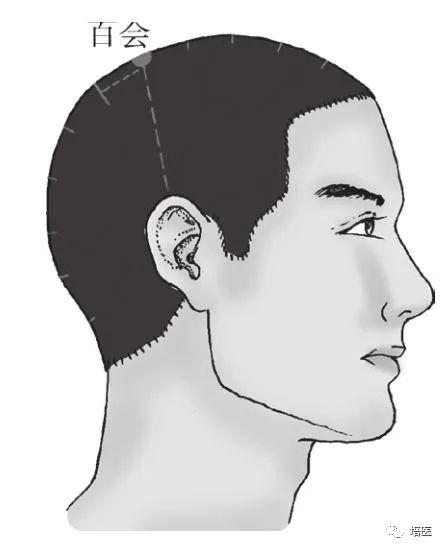
(1) Use a warming moxibustion device to moxibustion Baihui, Shenshu, and Mingmen from top to bottom, moxibustion each acupoint for 5-7 minutes, once daily, for a course of 10 days. This method harmonizes Qi and blood and warms the middle while dispersing cold.
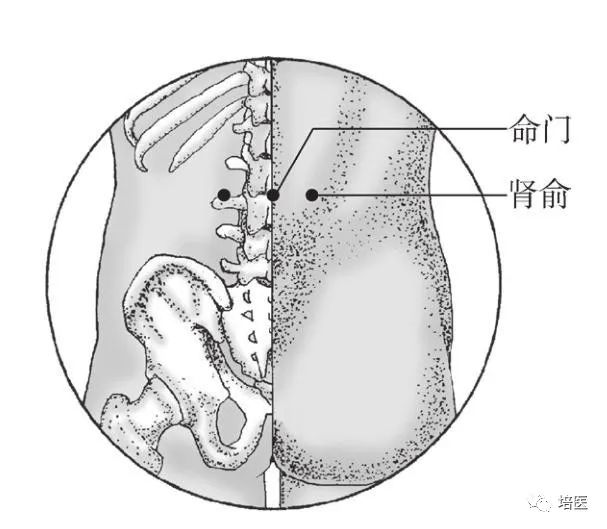
(2) Use a warming moxibustion device to moxibustion Qihai, Guanyuan, and Zhongji from top to bottom, while also soaking the feet in hot water (up to the knee joint) until the skin turns red.
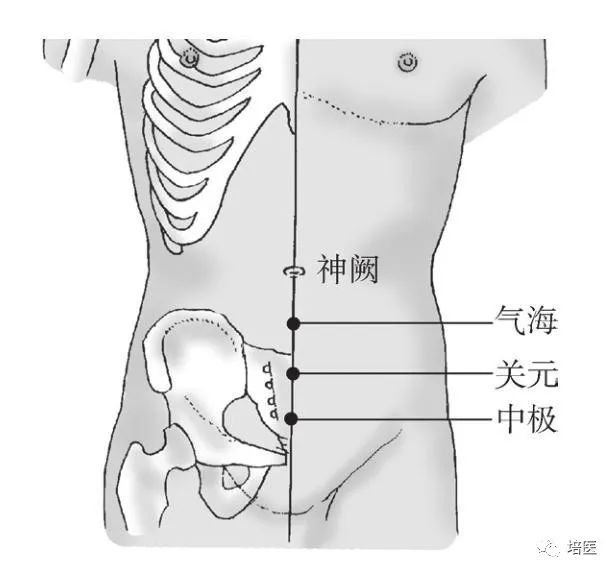
(3) Use salt and ginger for moxibustion on Shenque. Take a slice of ginger the size of a one-yuan coin, about 0.7-0.8 cm thick, a little salt, and pure moxa wool (note: the moxa wool should be soft and pure like cotton, without impurities, otherwise, it will produce excessive smoke and may cause burns). Fill the navel with salt, place the ginger slice on top (with a needle hole in the ginger slice). Light the prepared moxa cone and let it burn slowly, placing another cone after the first one burns out, until the salt in the navel turns yellow and wet, feeling as if warm water is slowly flowing in the abdomen.
2. Massage
(1) Rub the Taiyang point. Use the middle or index finger to rub the Taiyang point (located between the outer corner of the eye and the eyebrow, about one finger’s width back) 100 times.
(2) Rub the Yintang point. Use the middle or index finger to rub the Yintang point (located between the two eyebrows) 100 times.
(3) Rub the Baihui point. Use the palm to massage the Baihui point at the center of the top of the head, massaging 50 circles in both clockwise and counterclockwise directions, 2-3 times daily.
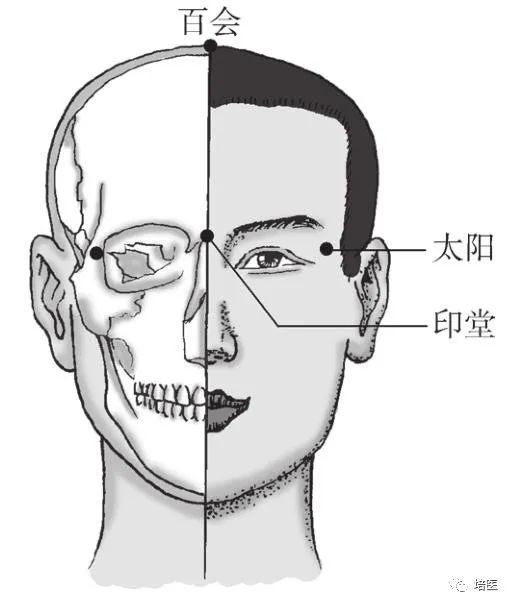
(4) Finger-comb the hair. Spread the fingers of both hands and comb from the front hairline to the back hairline 66 times, which can promote Qi and blood circulation and unblock the meridians.
(5) Rub the Fengchi point. Rub the Fengchi point 100 times, located in the depression at the back of the head (between the sternocleidomastoid muscle and the upper end of the trapezius muscle).
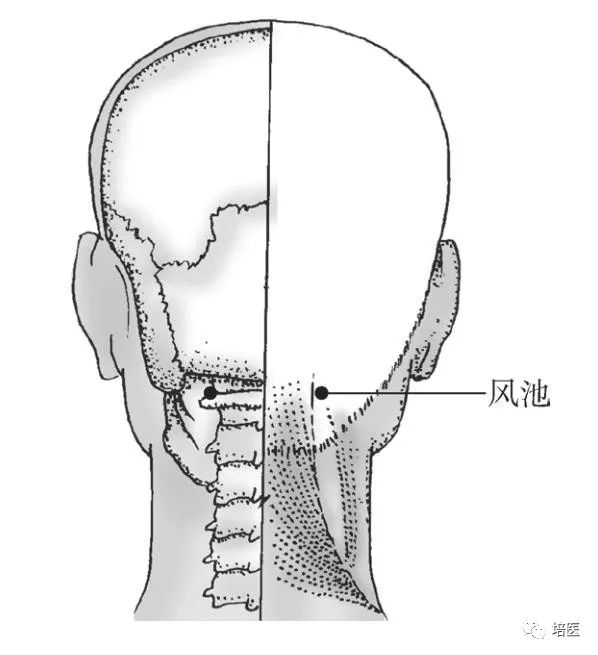
(6) Rub the Mingmen point. Rub the Mingmen point 100 times, located in the center of the lower back (in the depression below the second lumbar vertebra).
(7) Knead the lumbar muscles. Repeatedly knead the muscles on both sides of the spine from top to bottom.
(8) Press the lumbar-sacral area. Apply pressure until a feeling of soreness, numbness, swelling, or pain is felt, generally pressing each acupoint for 1-2 minutes. Start with Shenshu, then Dazhui (1.5 inches lateral to the fourth lumbar vertebra), and then the eight sacral points (upper, middle, and lower sacral points, a total of eight acupoints located in the four sacral foramina).
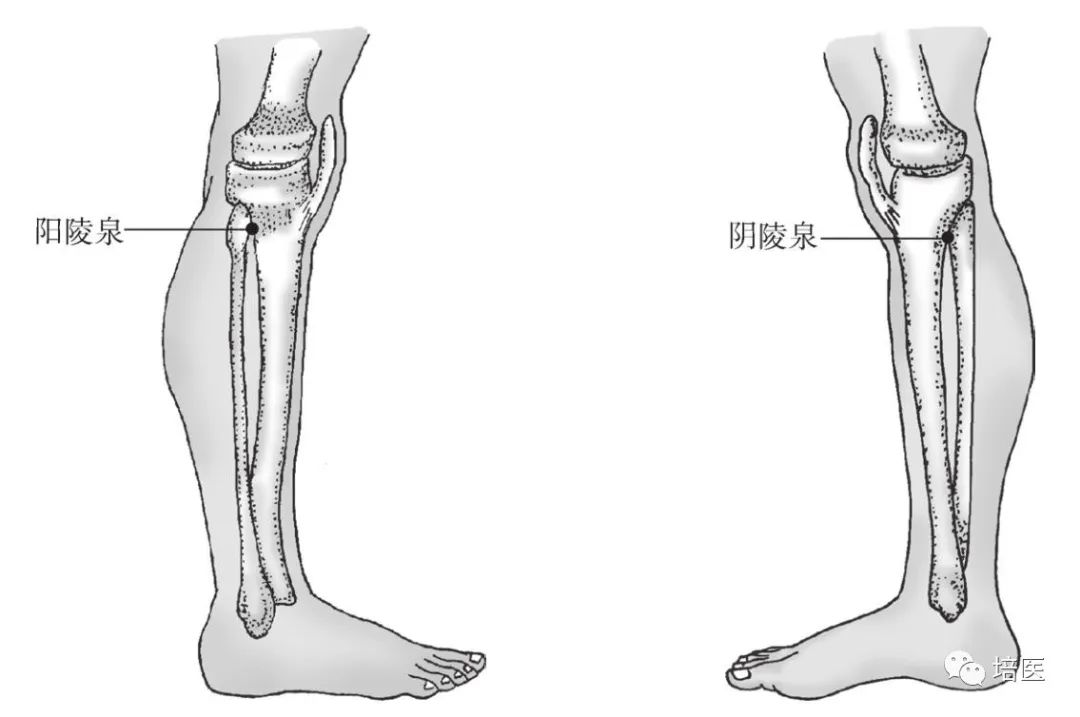
(9) Massage Shenque, Guanyuan, and Qihai each 100 times, and rub around the navel in a counterclockwise direction for 30 circles.
(10) Rub the Yanglingquan and Yinlingquan points each 100 times.
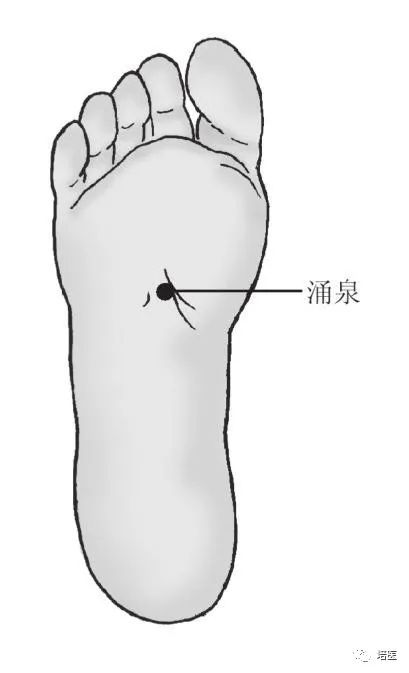
(11) Rub the soles of the feet until warmth is felt. Alternatively, massage the Yongquan point 100-200 times before bed each night.

3. Plastering
The plastering method is generally most effective during the summer’s three hottest days. For those with a long history or stubborn conditions, the frequency of plastering can be increased, but the duration should not exceed 24 hours. Summer is the best season to replenish Yang Qi. According to the principle of “heaven and man in correspondence,” for individuals with chronic diseases such as asthma, bronchitis, chronic rhinitis, chronic colitis, chronic gastritis, and dysmenorrhea, those with Yang deficiency constitution can choose the “winter disease summer treatment” method, using warming herbs to plaster specific acupoints or moxibustion on points such as Zusanli, Qihai, Guanyuan, Shenshu, and Mingmen to improve their constitution.
Medicinal Health — Warming and Nourishing the Spleen and Kidney
Clinically, Yang deficiency constitution is often characterized by spleen Yang deficiency and kidney Yang deficiency, mostly manifesting as cold extremities, low body temperature, cold hands and feet, or cold sensations in the waist and back. Therefore, the basic principle of medicinal health for individuals with Yang deficiency constitution is to warm and nourish the spleen and kidneys, and they can take some warming and nourishing herbs such as deer antler, psoralea, walnut, mulberry, eucommia, cuscus, and cinnamon, which can also be made into medicinal pastes for long-term consumption.
1. Jin Gui Shen Qi Wan
Ingredients: Rehmannia glutinosa, Dioscorea opposita, Cornus officinalis, Poria cocos, Alisma orientalis, Moutan, Aconitum, Cinnamon.
Dosage: Oral administration, 6g for water honey pills, 9g for small honey pills, 1 pill for large honey pills, 2-3 times a day.
Effects: Warms and tonifies kidney Yang.
Indications: For symptoms of kidney Yang deficiency, characterized by low back pain, weakness of the legs, cold sensations in the lower body, urgency of the lower abdomen, difficulty urinating, or frequent urination, as well as foot edema, phlegm, and thirst. This formula is a renowned prescription for treating kidney Yang deficiency. Subsequent series of “Di Huang Wan” are derived from this formula. If there is no dry mouth or constipation after taking it, it is suitable.
2. You Gui Wan
Ingredients: Rehmannia glutinosa, Aconitum, Cinnamon, Dioscorea opposita, Cornus officinalis, Cuscus, Deer antler glue, Goji berries, Angelica, Eucommia.
Dosage: Oral administration, 6g for water honey pills, 9g for small honey pills, 1 pill for large honey pills, 2-3 times a day.
Effects: Warms and tonifies kidney Yang, replenishes essence and blood.
Indications: For elderly individuals or those with chronic illness characterized by cold extremities, weakness in the waist and knees, impotence, nocturnal emissions, or Yang deficiency with infertility, or reduced appetite, loose stools, or incontinence. This formula has a stronger warming effect on kidney Yang than Jin Gui Shen Qi Wan. Use with caution in patients with hypertension.
3. Si Shen Wan
Ingredients: Psoralea, Evodia, Myristica, Schisandra, Fresh ginger, Jujube.
Dosage: Oral administration, 9g once, 1-2 times a day.
Effects: Warms the kidneys, strengthens the spleen, and stops diarrhea.
Indications: For symptoms of kidney fire decline, spleen and kidney deficiency, early morning diarrhea or loose stools with abdominal pain, and cold sensations in the waist and limbs. This formula is renowned for treating early morning diarrhea.
Further Reading
-
Human Meridian and Acupoint Atlas (High Definition), Collection for Reading
-
400 Acupoints, Explanation of Acupoint Names
-
[Meridian Health] Nourishing the Lung Meridian to Cure Various Diseases, Hand Taiyin Lung Meridian Health Effects
-
[Health Secrets] Morning Tooth Tapping, Eating Yuyuan, Health Maintenance Methods That Can Be Done Anytime
-
[Seasonal Health] 24 Solar Terms Moxibustion Health Maintenance Methods and Acupoint Explanations
-
[Meridian Health] The Cleaner on Duty at the Rabbit Hour, A Versatile Worker Balancing Three Places, Hand Yangming Large Intestine Meridian Health Effects
-
[Meridian Health] Nourishing the Lung Meridian to Cure Various Diseases, Hand Taiyin Lung Meridian Health Effects
-
[Constitution Health] Health Strategies for Balanced Constitution
Recommended Columns
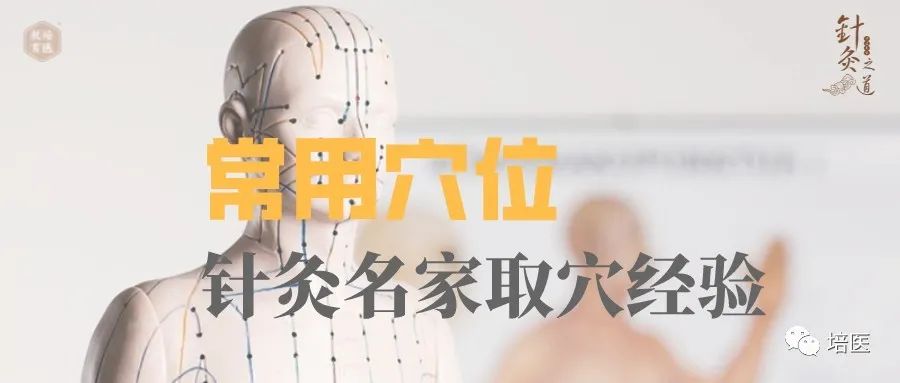
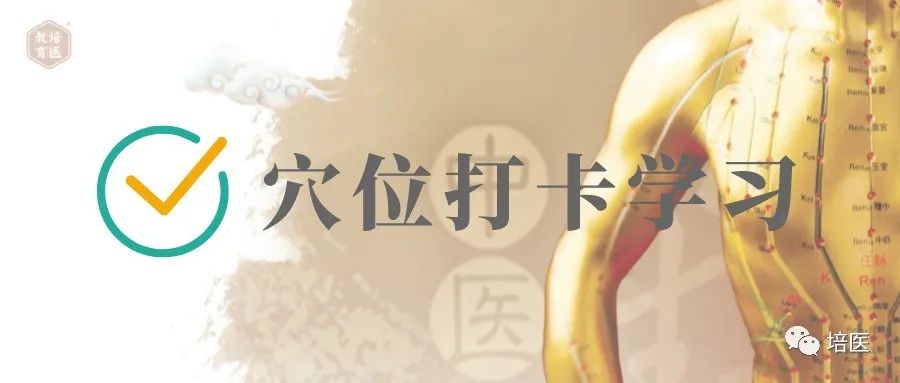
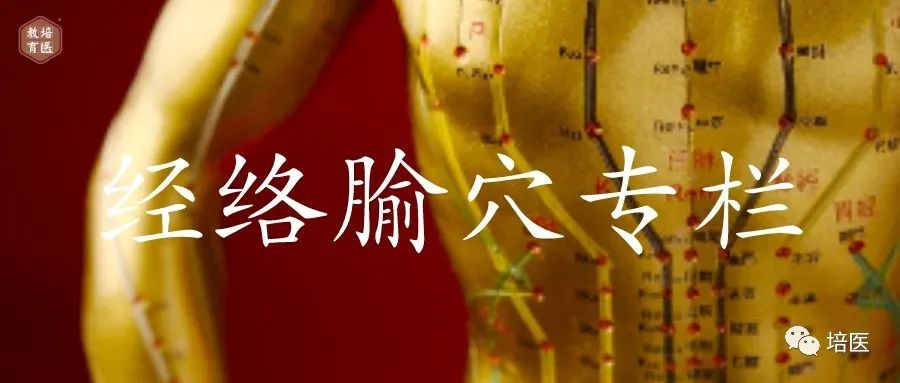
Note: This article is organized by Peiyi Education (www.tcmedu.com), excerpted from “Health Strategies for Constitution.” The various prescriptions and remedies mentioned are for reference and learning purposes only and should not be used as prescriptions. Please do not use them blindly; this platform does not bear any responsibility for any consequences arising from this!

